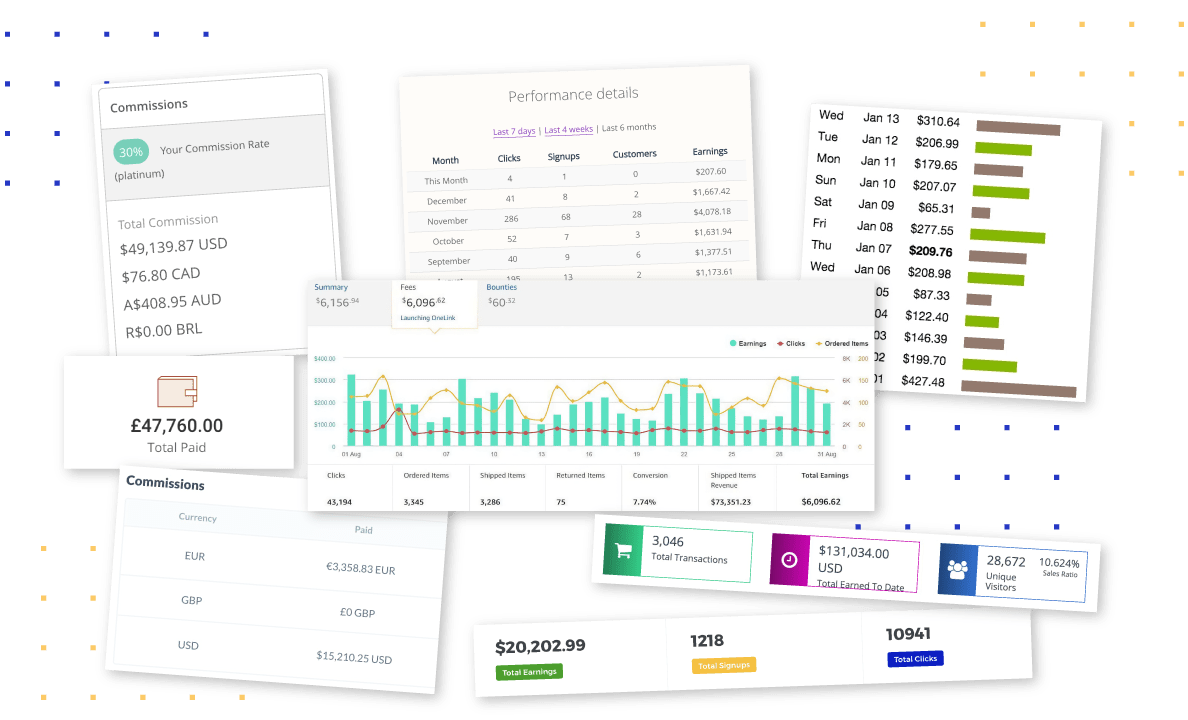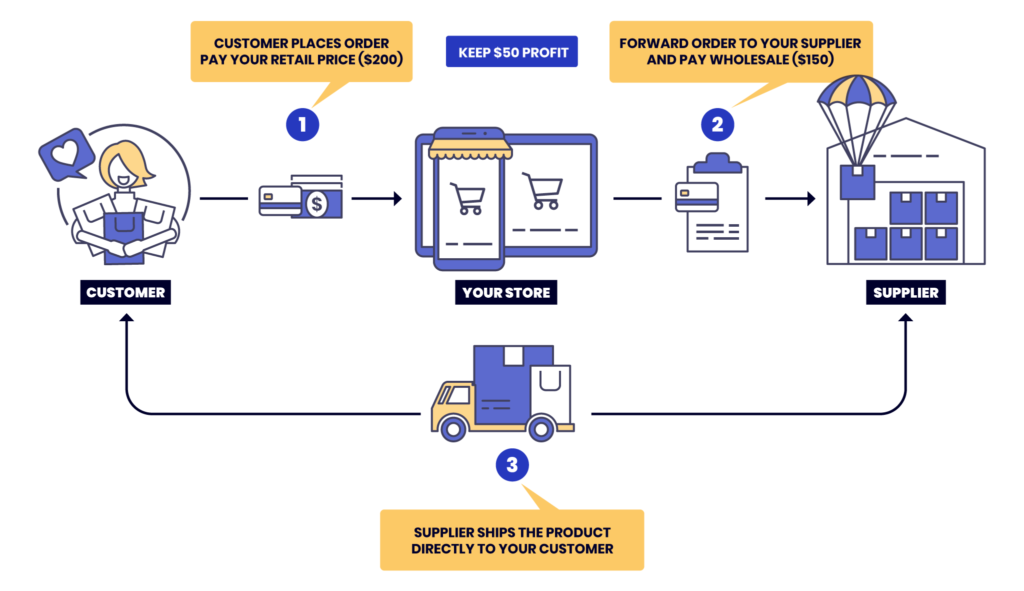Affiliate marketing vs dropshipping — it’s one of the hottest rivalries in the entrepreneurial world. Both sides are certain they’re the smart ones.
We’ve found a ton of success in affiliate marketing, building many profitable websites — including a few that we’ve sold for 6-figure sums.

However, we can’t deny the appeal of launching a dropshipping store. So which is best?
Let’s dive into our head-to-head analysis of dropshipping and affiliate marketing to find out.
⏰ TL;DR: Affiliate Marketing Vs Dropshipping
Affiliate marketing is about promoting products for a commission, while dropshipping sells products directly to customers.
Affiliate marketing is great for side hustlers who want to focus on content creation and traffic generation.
Dropshipping is better for entrepreneurs who want to manage their own store and customer data
Affiliate Marketing Vs Dropshipping: Pros & Cons
We’ll dive into the details of both affiliate marketing and dropshipping below, but to put it simply, the key difference between the two is in how you earn money.
With affiliate marketing, you promote a brand’s products or services and earn a commission for each sale or lead you refer. With dropshipping, you sell products directly to customers and earn money from the difference between the retail price and the wholesale price.
Now, let’s dive deeper into affiliate marketing.
What Is Affiliate Marketing?

Affiliate marketing is a way to earn money by promoting a brand’s products or services. You sign up to an affiliate program, share a unique link with your audience, and when someone makes a purchase or completes an action through your link, you earn a commission.
Referrals are recorded through a tracking code placed in the affiliate link.
As low-risk business models go, affiliate marketing is a great option.
Affiliate Marketing Business: Pros
1. No Need to Worry About Customer Support
You won’t be shocked to learn that a lot of the (many) advantages of affiliate marketing are disadvantages of dropshipping, and vice versa. This first point is definitely one of those.
As I’ve already noted, to make affiliate marketing profitable, all you need to do is drive traffic, recommend products, and funnel people to a quality online store to convert. Everything else is simply none of your business!
This means you don’t have to worry about delivery times, returns, or other complicated logistics. Instead, you can focus on what you can control: writing amazing content and building the best affiliate website you can.
2. Getting Started Is (Relatively) Easy
The word “easy” is a little misleading here, so let me explain: When I say “easy”, I don’t mean you can expect to launch an affiliate website and immediately start bringing in a huge revenue stream.
That just won’t happen.
However, affiliate marketing is comparatively easy to get started with. You don’t need any specific technical skills or specialist knowledge. You just need to be prepared to put in the hours investigating potential niches, researching high-intent keywords, signing up for an affiliate program or two, and writing amazing content. Best of all, you don’t need a ton of startup capital. You can even build a website yourself if you have the time and patience.
That’s why many people start out in affiliate marketing as side hustlers, dedicating more time to it once they’re earning a job replacement income.
3. Earn Passive Income
While Dropshipping is a great business model, it’s not passive income (at least, not totally). You still need to manage store inventory, customer support, and digital marketing efforts. With affiliate marketing, once you’ve got things up and running, you can afford to dial out of the day-to-day running of your website.
Hire freelancers to bring in traffic and sign up with affiliate networks to handle tracking and commissions. Then, sit back as the money rolls in! Of course, this is the best-case scenario. In reality, you’ll likely be heavily involved in digital marketing and content creation for the foreseeable future.
But once you’re in a position to outsource, you can earn passive income while lying on a beach or backpacking across Europe – the choice is yours! Or, like us, you might launch a bunch of new affiliate websites. We’re never satisfied!
Affiliate Marketing Business: Cons
1. Little Negotiating Power Over Commissions
Okay, so this one isn’t 100% true. Most affiliate marketers have little negotiating power over commissions. If you’re a huge affiliate referring massive volumes of sales, you might be able to negotiate a preferential commission rate. But for most, you’ll have to accept the commissions on offer.
In highly competitive niches with lower profit margins, commissions tend to be similar across affiliate programs. Higher profit margins mean more wiggle room, but you shouldn’t expect to negotiate a better commission rate unless your performance backs it up.
It’s also worth mentioning that affiliate programs can change their commissions over time. And by “change”, I almost always mean “reduce”.
Amazon is a good example. (Despite this, our affiliate marketing statistics page shows that Amazon Associates is the most popular affiliate network, with 58.5% of affiliate marketers using it.)
You might wake up one morning and learn your commissions are going to be halved. And there’s really not much you can do about it, beyond finding a different affiliate program or choosing a whole different niche.
2. Payments Aren’t Always Prompt
If you hang around affiliate marketing forums long enough, you’ll hear plenty of horror stories about affiliates waiting months to get hold of their commissions, or being ghosted and never getting paid at all.
Thankfully, that’s pretty rare.
If you work with one of the big affiliate networks, it’s extremely unlikely that you’ll be ripped off. (And honestly, if you are, it’s more than likely because you breached the terms of service). But there’s no getting away from the fact that slow payments are often a fact of life in the affiliate marketing world.
While it’s possible to find affiliate marketing programs that offer weekly payments or even daily payments, most will keep you waiting at least a month before sending your precious commissions.
3. Customers Might Mess With Your Affiliate Link
While there are a few bad apples out there, affiliate marketing is a legitimate industry and revenue stream, but there’s not a lot of consumer understanding about it. No matter how much time and effort you put into clearly displaying your affiliate disclaimer and explaining how the business model works, some people will never be convinced.
They may think that buying through your affiliate link will cost them more, so they remove the tracking elements, cheating you out of a commission. You can sometimes get around this by using a link shortener, but it’s not always possible (for instance, some affiliate programs don’t allow link masking).
Beyond that, there’s no real solution to this problem — we just have to wait for consumers to be better educated about the realities of affiliate marketing. However, in our experience, this is a pretty niche concern.
Most customers don’t care what the URL looks like; they just want useful advice and a good price. And you can give them both.
What is Dropshipping
Dropshipping is a way to sell products without holding inventory. When a customer places an order, the vendor buys the product from a third party, such as a manufacturer or wholesaler, who then ships it directly to the customer.
As such, the vendor acts as a middleman between customer and supplier.

Dropshipping Business: Pros
1. Get Paid Straight Away
A big advantage of selling dropshipping products is that you don’t have to wait around for weeks (or even months) to get paid. When you sell something, you get paid immediately. There’s no minimum sales threshold or Net 30 payment terms.
In reality, if your dropshipping e-commerce store takes off, it’s doubtful you’ll immediately transfer every payment straight into your bank account the second a sale comes in. But it’s definitely nice to access your earnings without some third-party business holding onto them for a month.
2. Greater Control
As you know, we love affiliate marketing. But the reality is that you’re always going to make more money for someone else than you’ll earn yourself. At the same time, you can’t randomly decide to offer a discount or run a promotion, because it’s not your business. You’re just a referral partner.
It’s not like that with a dropshipping store.
You manage the prices, you control the incentives. If you want to drive volume, you can launch a flash sale. If you want to increase average order value, you can introduce a multibuy offer.
Already built a loyal audience? Great! Now you can potentially raise your prices and improve your profit margins.
The choice is yours.
In this way, dropshipping is arguably more like running a “real” business than affiliate marketing.
3. More Scope to Retain Customers & Own Your Audience
Clearly, I’m not saying there’s no way for an affiliate business to build a loyal audience. But it’s arguably easier to do so as a dropshipper. That’s partly down to the previous point: control.
By setting your own prices and promotions, you have more ability to control your messaging, which in turn helps you build a more unique proposition. Nail your proposition and you’ll go a long way to attracting customers and driving repeat business.
There’s another important element to this, too: As a dropshipping business, you have full control over the customer data you generate.
That means you can retarget your own website visitors with paid media campaigns, helping to bring people back to your site and improve your conversion rate.
It’s more difficult (and sometimes impossible) to do that as an affiliate marketer, for two main reasons:
- You’re driving the potential customer away from your affiliate website and toward a third-party online store (or some other kind of affiliate partner).
- Your margins will typically be lower, because you only earn a percentage of every sale.
Dropshipping Business: Cons
1. You Need to Manage Customer Support
Affiliate marketing is a classic example of a hands-off business. Someone hits your affiliate link, heads to a third-party ecommerce store, and makes a purchase. Once they’ve been referred, the affiliate’s work is over. All the other stuff is the responsibility of their affiliate partner.
With a drop-shipping business, that’s simply not the case.
The potential customer doesn’t care about the finer points of the dropshipping business model; it doesn’t matter to them whether or not you actually carry inventory. That means they’ll definitely expect you to handle customer service.
If something goes wrong, you’re the one who needs to sort it out.
An online business that started out as a side hustle can quickly become a huge drain on your time, with lots of chasing up customer orders and responding to queries.
Being a successful dropshipping store owner is a lot of work, so it’s no surprise that many choose to outsource the customer service side to a third party. Freelancers and specialist agencies earn a tidy income by offering these services to overworked dropshippers.
2. Little Control Over Fulfillment
Okay, so maybe managing customer support doesn’t sound like such a bad thing. After all, you might enjoy talking to customers and helping them out. But that leads us to another frustration of dropshipping: you don’t actually have much control over the whole shipping process. Yet the customer holds you accountable for timely delivery. Suppliers have their own priorities and challenges, and may not be concerned about hitting the delivery date for a single order.
If they’ve just received a huge order from another ecommerce store, they might not be too concerned about hitting the delivery date on the single pair of sneakers you sold.
To make matters worse, you might find yourself with little or no transparency over what’s going on. You’ve been sent a shipping order ID, but the first you hear about a problem is when the irate customer tags you in an angry Twitter post.
Three-quarters of customers who encounter a poor delivery experience would likely stop recommending the retailer, according to research from Circuit.
So even though the whole fulfillment side of the business has little to do with you, late deliveries can still do real damage to your own brand.
3. Building An Audience From Scratch Is Tough
To an extent, this point is relevant to both dropshipping businesses and affiliate marketing. But at least affiliate marketers get to “lean on” the brand awareness of their affiliate partners.
As a dropshipper, you likely won’t get that opportunity. You might even find yourself competing directly with the brands whose products you’re selling. That can make it extremely difficult to build traction, especially if you’ve chosen a competitive niche.
Think about it:
Most customers won’t know who you are. They’re just shopping around for the most attractive deal (whatever that means to them).
You (probably) can’t guarantee faster delivery than anyone else. And if your niche is competitive, you likely won’t have much margin to play with either, so cutting prices might not be an option.
In short, you’ll need to get creative to get people’s attention and persuade them to buy from you.
Affiliate Marketing Vs Dropshipping: Which One Is Better?
Dropshipping. Affiliate marketing. Which one takes the crown?
Honestly, both dropshipping and affiliate marketing are great ways to earn money online.
They might have totally different business models, but both allow you to get up and running with minimal time and investment.
That means it’s basically an impossible question, because the answer depends upon your own circumstances.
If you’re looking for a sideline you can dip into and out of as time allows, and that can be easily scaled later on once you’re bringing in lots of passive income, affiliate marketing is hard to beat.
But if you crave the control that ecommerce entrepreneurs enjoy from opening their own stores, you won’t get it from affiliate marketing. At least, not really.
In which case the dropshipping market could be exactly what you’ve been searching for.
Affiliate Marketing Vs Dropshipping: Conclusion
If you’ve decided dropshipping is the only choice for you, we genuinely wish you the best of luck.
It’s a tough business, but if you’re smart and you put the hours in, there’s no reason you can’t make it work.
But if affiliate marketing is your preferred avenue, we can definitely help.
Having launched our first affiliate website back in 2013, we like to think we know a thing or two about affiliate marketing.
And we’d love to share our knowledge with you!
Just sign up for our free training and we’ll teach you seven simple steps to create a high-performing authority site in 2024.
FAQs
Can you do affiliate marketing and dropshipping at the same time?
Yes, it’s possible to do both dropshipping and affiliate marketing. In fact, many online entrepreneurs use a combination of both business models to maximize their earning potential.
What is the difference between affiliate markering and dropshipping?
The main difference between affiliate sales and dropshipping is that with affiliate sales, you earn a commission for promoting someone else’s products. With dropshipping, you sell products that you don’t actually own or stock. Instead, you purchase products from a third-party supplier only when a customer places an order.
Which one is better for beginners, affiliate marketing or dropshipping
Both affiliate marketing and dropshipping are beginner-friendly business models. However, affiliate marketing is generally considered easier than dropshipping because it requires less work.
Which is easier, affiliate marketing or dropshipping?
Affiliate marketing is generally considered easier than dropshipping because it requires less investment and effort. With affiliate marketing, you don’t have to worry about inventory management or order fulfillment.
Which one has more earning potential, affiliate marketing or dropshipping
Both affiliate marketing and dropshipping have high earning potential. However, the earning potential of each business model depends on various factors such as niche selection, marketing strategy, and execution.
Which is better, affiliate marketing or dropshipping?
There is no definitive answer to this question. Both business models have their pros and cons. Affiliate marketing is a hands-off business model that requires less investment and effort than dropshipping. On the other hand, dropshipping offers more control over the products sold and the prices charged.
If you want total control over pricing, promotions, customer support, and more, dropshipping is the better choice. But if your top priority is to find a great niche, right about products you love, and earn passive income, affiliate marketing is the one.
Which is more profitable, affiliate marketing or dropshipping?
Both affiliate marketing and dropshipping have the potential to be profitable. However, the profitability of each business model depends on various factors such as niche selection, marketing strategy, and execution.








